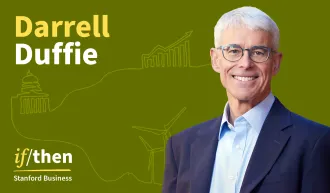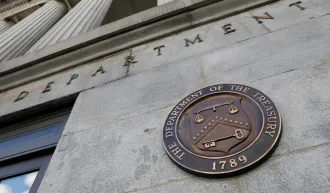Billionaires Can’t Solve Our Problems, Says ‘Davos Man’ Author
‘New York Times’ reporter Peter Goodman discusses rising inequality and the roots of populism.
May 03, 2024

Goodman spoke at an event cosponsored by Stanford GSB’s Corporations and Society Initiative. | Lisa Sanchez-Corea Simpson
In January 2017, New York Times reporter Peter Goodman went to the World Economic Forum, the annual gathering of international elites in Davos, Switzerland. As he mingled, he asked attendees this pointed question: “‘You’re worried about populism. You’re a little spooked by Brexit and Trump talking about blowing up the dollar and blowing up NATO. And we’re going to have a trade war. What are you, personally, willing to give up to deal with inequality?’”
CASI Visiting Speakers
The Corporations and Society Initiative (CASI) hosts a variety of events for members of Stanford GSB, Stanford University, and the broader community to discuss the complex and interacting forces that impact corporations and society.
In reply, Goodman heard about the need for more deregulation or how workers needed to take control of their futures by training themselves. “I heard everything except for, ‘Well, some of the people who are here in Davos, we have to give up some of our gains so that we can have infrastructure and education, affordable housing and things that polls show everyone actually wants,’” Goodman said.
Goodman explores this disconnect in his 2023 book Davos Man: How the Billionaires Devoured the World, which he discussed at Stanford Graduate School of Business on April 23. The talk, moderated by Rachel Keathley, MBA ’24, was sponsored by the GSB’s Corporations and Society Initiative and the Stanford Program on Capitalism and Democracy.
When he uses the term “Davos man,” Goodman said, he is talking about the billionaire class whose members are “the ultimate beneficiaries of the status quo.” While they openly acknowledge social, economic, and environmental problems, they are reluctant to endorse policies that might challenge their wealth. Instead, Goodman explained, they argue that they are in the best position to fix the system that they profit from.
“They’re not content to simply have most of the money and live at a standard that most of us can’t even imagine,” Goodman said. “They would ask us to believe that they are the good guys in the narrative so that we can trust them to solve our problems. It’s a story that says, ‘You don’t have to use democracy. You don’t have to regulate us. You don’t have to tax us. You don’t have to worry about antitrust law. Just let us meet together and we will solve your problems. We will take care of systematic discrimination. We will take care of climate change. We will take care of education and healthcare.’”
Goodman emphasized that the billionaires he reports on — and the innovations they have fostered — are not bad. “I’m a big fan of technology, and I love innovation,” he said. “I’m pro-business — I like hanging out with entrepreneurs and hearing their ideas.”
Yet he argues that the billionaires’ approach leads to a society that is organized around the interests of its wealthiest members and allows them to use the political system to amass more wealth. “We’re living in what is, on paper, the richest, most powerful country on earth, and we didn’t have PPE [personal protective equipment] in the middle of a public health crisis that killed a million people,” Goodman said. “Our infrastructure is crumbling. Education is unaffordable for lots of people. Housing is unaffordable for lots of people.”
Although much of his talk focused on the United States, Goodman said this is not just an American story. He started writing his book while living in the United Kingdom and trying to understand why the country had decided to leave the European Union. Though it’s a complex story, it had its roots in lingering resentment of bank bailouts and austerity measures taken in response to the financial crisis of 2008. Brexit, Goodman said, was “a way to stick it to the elites.” Many countries are seeing a similar backlash against inequality and a shift toward populism.
“Eventually, we have huge numbers of people who are very angry and who conclude — not without reason — that the elites don’t care about their needs much, and then become targets for political opportunists to sell all sorts of crackpot ideas: demonizing outsiders, immigrants — while often prescribing solutions that make real economic problems worse,” Goodman said.
As to what can be done about the problems the book outlines, Goodman said democracy is at the heart of the solution. “I don’t think there’s anything wrong with business and people pursuing profits through business. I just think we have to get back to also exercising democracy so that the public gets some say about how this whole thing goes,” he said. That means increased regulation and oversight. “We’re not going to have great education, we’re not going to have highways, we’re not going to have somebody worrying about planes not crashing in the air or giant container ships taking out bridges in major cities, unless we’ve got somebody watching.”
Goodman also offered a preview of his upcoming book, How the World Ran Out of Everything: Inside the Global Supply Chain, which he began writing during the pandemic. The book follows a shipping container from a factory in China to a warehouse in Mississippi — and like Davos Man, it explores the impact of concentrated power.
His advice for GSB students: “Get rich, enjoy your wealth, but don’t internalize this absurd message that this makes you inherently good and [that] you gave at the office. You still have to pay your taxes so that the next generation of people can get education and drive around and make use of public goods like the Internet to create their own businesses.”
For media inquiries, visit the Newsroom.
Explore More

Yes “We” Can: Swapping Pronouns Can Make Messages More Persuasive

Will a Police Stop End in Arrest? Listen to Its First 27 Seconds.



